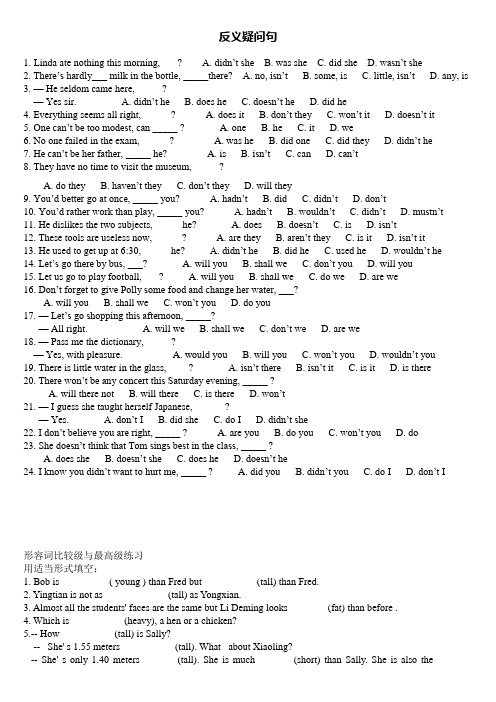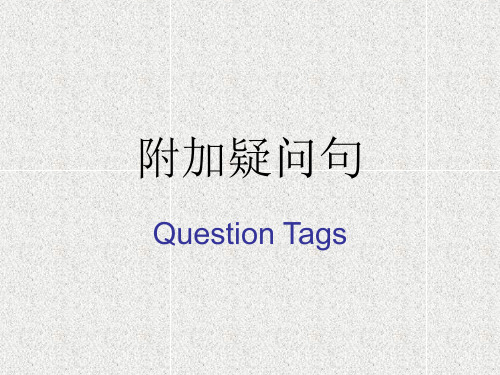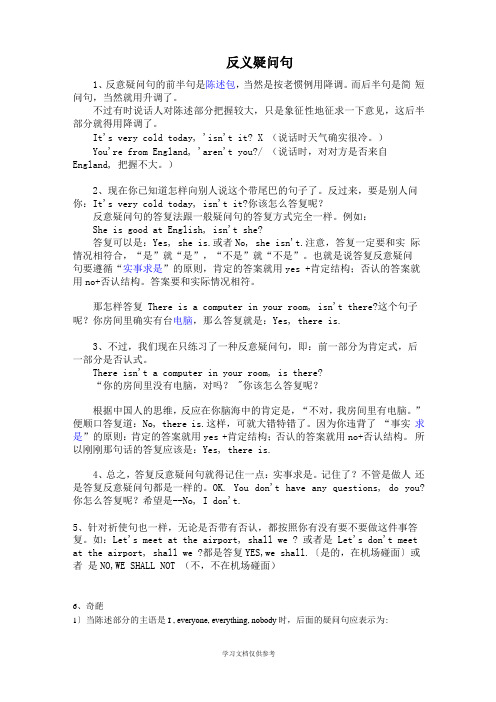反意疑问句(教师版)
常用反义疑问句

(1)everyone,no one,nobody ,everybody, anybody, anyone, somebody, someone, nobody, none, neither 时等时,后面的疑问句应表示为:Everyone is in the classroom, aren't they? (基本不用单数,但也可用he)Nobody will go, will they?(2)everything,anything,nothing,something时,附加疑问句中主语一般用it 不用they(3)this,that,或those,these时,附加疑问句中主语用it和they.A当陈述部分有never,seldom, hardly,few,little,barely, scarcely, nothing, little, not, no, no one, nobody, nothing, none, neither 等否定意义的词时,后面的反意疑问句则为肯定形式:There are few apples in the basket, are there?He can hardly swim, can he?They seldom come late, do they?B当陈述部分含有否定意思的词是unhappy,dislike,unfriendly等含有否定词缀的派生词,也就是有un-前缀、-less后缀等含有词缀而意思否定的词,当做肯定句处理,疑问部分要用否定形式。
如:He looks unhappy,doesn't he?他看上去不高兴,不是吗?The girl dislikes history,doesn't she?这女孩不喜欢历史,不是吗?表示主语主观意愿的词含有think, believe, suppose, imagine, expect等动词后接宾语从句构成的主从复合句在构成反意疑问句时,视情况不同有两种不同的构成方式。
反义疑问句讲解与练习

反义疑问句讲解与练习一、含be(is, are, was, were)动词的反意疑问句(1)句型1:主语+ be+其它,isn’t(aren’t, wasn’t, weren’t)+ 主语?句型2:主语+ be not+其它,is(are, was, were) + 主语?① You are from America, aren’t you? Yes, I am. No, I’m not.② It isn’t very cold today, is it? Yes, it is. No,it isn’t.(2)注意:There be句型例:There is an old picture on the wall, isn’t there?二、带行为动词反意疑问句(不含be和情态动词)句型1:主语+动词+其他,do/did/does + not +主语?句型2:主语+did/does/do+not +动词原形+其他,did/do/does+其他?例:You often watch TV in the evening, don’t you? Yes, I do. No, I don’t.三、含有情态动词的反意疑问句,反义疑问句中的动词使用情态动词。
例:The students must study hard, mustn’t they? Yes, they must. No, they needn’t.注意:You must go home now, needn’t you? Yes, I must. No, I needn’t.★注意:There be句型的一般将来时① There will be a basketball match tomorrow, won’t there?Yes, there will. No, there won’t.② There won’t be too much pollution in the future, will there?Yes, there will. No, there won’t.四、反义疑问句的回答:答语要和实际情况相符合,遵循“实事求是”的原则。
反义疑问句教学设计方案

1. 知识与技能:学生能够掌握反义疑问句的结构、用法和变化规律;能够正确运用反义疑问句进行日常交流。
2. 过程与方法:通过观察、比较、分析等方法,引导学生发现反义疑问句的特点;通过角色扮演、小组讨论等活动,提高学生的实际运用能力。
3. 情感态度与价值观:激发学生对英语学习的兴趣,培养学生良好的语言交际习惯,提高学生的自信心。
二、教学重难点1. 教学重点:反义疑问句的结构、用法和变化规律。
2. 教学难点:反义疑问句的回答。
三、教学过程1. 导入新课(1)教师用英语进行简单的问候,引导学生用反义疑问句回答。
(2)教师展示一些反义疑问句的例句,让学生观察并总结反义疑问句的特点。
2. 讲解反义疑问句的结构和用法(1)讲解反义疑问句的结构:主句+助动词/情态动词+主语+?(2)讲解反义疑问句的用法:询问事实、请求、建议等。
3. 讲解反义疑问句的变化规律(1)主句和反义疑问句的时态要保持一致。
(2)主语和助动词/情态动词的顺序要保持一致。
(3)反义疑问句的回答要根据实际情况进行。
4. 练习环节(1)教师出示一些反义疑问句的例句,让学生进行跟读和模仿。
(2)学生分组进行角色扮演,练习反义疑问句的问答。
(3)教师随机提问,检查学生对反义疑问句的掌握情况。
5. 总结与拓展(1)教师总结反义疑问句的结构、用法和变化规律。
(2)布置课后作业,让学生用反义疑问句进行写作练习。
四、教学反思1. 教师在讲解反义疑问句时,要注重结合实际情境,让学生在具体的语境中理解和运用。
2. 在练习环节,教师要给予学生充分的练习机会,鼓励他们积极参与,提高他们的实际运用能力。
3. 教师要及时了解学生的学习情况,针对学生的薄弱环节进行有针对性的辅导,帮助他们克服困难。
4. 教师要关注学生的学习兴趣,激发他们的学习热情,提高他们的英语学习效果。
最新反义疑问句(教案)

教学过程一、复习预习1、教师出示上节课预留的练习题,根据学生实际情况进行讲解分析;2、引导学生复习上节内容;3、并引入本节课程内容。
二、知识讲解考点/易错点1 反义疑问句基本原则1、遵循“前否后肯”或“前肯后否”的原则:Jim isn’t in Class Four, is he?2、前后两句主语相同:Mr Zhang has been here for four years, hasn’t he? 考点/易错点2 主语选用的特殊情况考点/易错点3 谓语选用特殊情况考点/易错点4 否定词的特殊情况句中有seldom, hardly, no, not, never, few, little, nothing, nobody, nowhere等是否定句,疑问部分必须采用肯定形式:Nobody phoned while I was out, did they?He is hardly able to swim, is he?There is little ink in your pen, is there?三、例题精析【1】I am right , ____________ ?答案:aren’t I【2】They can hardly believe it,________ ___________ ?答案:can they,他们很难相信(这件事),是吗?【3】Give me some money, _________ ____________?答案:will you,给我一些钱,好吗?四、课堂运用【基础】一、填空1.It’s very hot today, _______________ ?2. He can speak Chinese, _______________ ?3. Meimei studies in a middle school, _______________ ?4. He never gets up late , _______________ ?5. Don’t go out at night, _______________ ?【巩固】二、填空1.Everything starts to grow in spring, _______________ ?2.He can hardly finish his homework, _______________ ?3.I’m in Class 3,Grade 2, _______________ ?4.Let’s go shopping , _______________ ?5.She doesn’t like climbing hills , _______________ ?【拔高】三、单项选择1. Linda ate nothing this morning, ___?A. didn’t sheB. was sheC. did sheD. wasn’t she2. There’s hardly___ milk in the bottle, _____there?A. no, isn’tB. some, isC. little, isn’tD. any, is3. He has never ridden a horse before, ___?A. does heB. has heC. hasn’t heD. doesn’t he4. — He seldom came here, _____?— Yes sir.A. didn’t heB. does heC. doesn’t heD. did he5. Everything seems all right, _____ ?A. does itB. don’t theyC. won’t itD. doesn’t it7. One can’t be too modest, can _____ ?A. oneB. heC. itD. we8. No one failed in the exam, _____ ?A. was heB. did oneC. did theyD. didn’t he10. Neither you nor I am a artist, _____ ?A. am IB. aren’t weC. are weD. amn’t I答案:一、1 . isn’t it 2. can’t he 3.doesn’t she 4.does he 5.will you二、1.doe sn’t it 2.can he 3 .aren’t I 4.shall we 5.does she三、1—5 CDBDD 6—10 BACDC课程小结这节课我们主要学习了反义疑问句相关知识。
八年级英语上学期 反义疑问句练习题 湘教版

八年级英语上学期反义疑问句练习题湘教版1. There is little water in the bottle. (变反意疑问句) There is little water in the bottle, _________ _________?2. There are few people in the street, __________ ____________? (反意疑问句)3. There are few people on the island, _____________ ____________?(变反意疑问句)4. There are few problems getting there on time, ______________ _______________?(反意疑问句)5. There is nothing in the fridge, ___________ _____________? (反意疑问句)6. There are little sheep on the road. _________ __________? (反意疑问句)7. There is little water in the glass, ________ _________? (反意疑问句)8. There is a little water in the glass, ________ _________? (反意疑问句)11. Lets’ take the blue one, ________ ________? (变反意疑问句)12. Let’s begin our class, ___________ ____________?(反意疑问句)13. Let us have a rest, ________ _________? (反意疑问句)14. Let’s have a rest, _________ ___________? (反意疑问句)15. I can hardly remember her name, ___________ _____________?(反意疑问句)16. She can hardly speak English, ______________ _____________? (反意疑问句)17. She has few friends here, ________ __________? (反意疑问句)18. She ate little for breakfast this morning,____ _______ ____________?(反意疑问句)19. Maria never goes shopping alone, _________ __________?(反意疑问句)20. Kate never comes to school late, _____________ ______________? (反意疑问句)21. He is never late for school, _________ __________?(变反意疑问句)22. I have few friends here, _________ ________?(反意疑问句)23. I have few friends here. (变反意疑问句) I have few friends here, __________ ___________?24. We watched an exciting match yesterday, ______________ _____________? (变反意疑问句)25. John went to Shanghai last week, __________ _________? (变反意疑问句)26. His mother cooks at home very day, __________ __________? (变反意疑问句)27. Don’t play with the cat, ___________ _________?(反意疑问句)28. We think he can pass the exam,___________ _____________?(反意疑问句)29. Jim is unhappy today, ___________ __________?(反意疑问句)30. My mother ate nothing this morning, __________ __________? (反意疑问句)31. Let’s go shopping, ________ _________?(反意疑问句)32. We don’t think she is rig ht, __________ ___________? (反意疑问句)33. Let me help you, _________ __________?(反意疑问句)34. I met nobody on the way to school this morning, ________ ___________? (反意疑问句)35. She doesn’t think I am right, ____________ ______________? (反意疑问句)36. Mike did nothing this morning, __________ _____________?(反意疑问句)37. Let’s go hiking this Sunday, __________ _________? (反意疑问句)38. Her father didn’t come back last night, __________ ___________?(反意疑问句)39. She is never late for school, ________ _________? (反意疑问句)40. Let us have a rest, __________ __________? (反意疑问句)41. I think she is right, ___________ __________? (反意疑问句)42. His sister drank little water this morning, __________ ___________? (反意疑问句)43. Let’s go bicycling, __________ ___________? (反意疑问句)44. They d on’t think we are right, _________ __________? (反意疑问句)45. She often eats nothing for breakfast. ____________ _______________? (反意疑问句)46. He can speak little Japanese, _________ __________? (反意疑问句)47. We don’t think he is wrong, __________ ___________? (反意疑问句)48. Maria has few friends here, ____________ ______________?(反意疑问句)49. They don’t think we are their friends, __________ ___________? (反意疑问句)50. She knows nobody here, __________ ______________? (反意疑问句)51. I ate nothing this morning, __________ __________?(反意疑问句)52. Nobody thinks he is right, _________ ___________? (反意疑问句)53. He made his mother clean his room every day. (对划线部分提问)54. I knew nobody here when I got here,______________ ______________?(反意疑问句)55. She ate nothing this morning, __________ _____________?(反意疑问句)56. Kate learns Chinese all by herself. (对划线部分提问) __________ _________ Kate learn English?57. Let’s go shopping together, _________ __________? (反意疑问句)58. She can’t find her lost dog, _____________ ______________? (反意疑问句)59. This skirt is made of silk. (对划线部分提问) _________ _________ this skirt made of?60. I don’t know about her, ____________ _____________? (反意疑问句)61. We know little about Daniel Igali, ______________ _____________? (反意疑问句)62. Kate ate nothing this morning, ____________ ______________? (反意疑问句)63. She thinks Jim does well in swimming, __________ ___________? (反意疑问句)64. His mother knew nobody here, ___________ _________? (反意疑问句)65. I think she has little money, _________ __________?(变反意疑问句)66. Don’t open the door, ___________ ____________?(反意疑问句)67. Lets’ meet at the school gate, ____________ ___________?(反意疑问句)68. We thought he had no money, ___________ _____________?(反意疑问句)69.Let’s have a rest, __________ ___________?(反意疑问句)70. I think he has nothing to eat, _______ _________?(变反意疑问句)71. I think she is from Japan, __________ __________? (反意疑问句)72. I thought he was at home yesterday, _________ __________? (反意疑问句)73. She thinks I love her, ___________ __________ (反意疑问句)74. They think she is wrong,_________ ___________? (变反意疑问句)75. He thinks she loves her, __________ _____________? (反意疑问句)76. I don’t think she is beautiful, __________ ___________?(反意疑问句)77. He thinks he has nothing to do, ___________ ___________? (反意疑问句)78. We don’t think Luc y can do it, _________ __________? (反意疑问句)。
教师用 反义疑问句经典练习(含答案)

反义疑问句1.Linda ate nothing this morning, ___? A. didn’t she B. was she C. did she D. wasn’t she2. There’s hardly___ milk in the bottle, _____there? A. no, isn’t B. some, is C. little, isn’t D. any, is3. — He seldom came here, _____?— Yes sir. A. didn’t he B. does he C. doesn’t he D. did he4. Everything seems all right, _____ ? A. does it B. don’t they C. won’t it D. doesn’t it5. One can’t be too modest, can _____ ? A. one B. he C. it D. we6. No one failed in the exam, _____ ? A. was he B. did one C. did they D. didn’t he7. He can’t be her father, _____ he? A. is B. isn’t C. can D. can’t8. They have no time to visit the museum, _____?A. do theyB. haven’t theyC. don’t theyD. will they9. You’d better go at once, _____ you? A. hadn’t B. did C. didn’t D. don’t10. You’d rather work than play, _____ you? A. hadn’t B. wouldn’t C. didn’t D. mustn’t11. He dislikes the two subjects, _____ he? A. does B. doesn’t C. is D. isn’t12. These tools are useless now, _____ ? A. are they B. aren’t they C. is it D. isn’t it13. He used to get up at 6:30, _____ he? A. didn’t he B. did he C. used he D. wouldn’t he14. Let’s go there by bus, ___? A. will you B. shall we C. don’t you D. will you15. Let us go to play football, ___? A. will you B. shall we C. do we D. are we16. Don’t forget to give Polly some food and change her water, ___?A. will youB. shall weC. won’t youD. do you17. —Let’s go shopping this afternoon, _____?— All right. A. will we B. shall we C. don’t we D. are we18. — Pass me the dictionary, _____?— Yes, with pleasure. A. would you B. will you C. won’t you D. wouldn’t you19. There is little water in the glass, ____? A. isn’t there B. isn’t it C. is it D. is there20. There won’t be any concert this Saturday evening, _____ ?A. will there notB. will thereC. is thereD. won’t21. — I guess she taught herself Japanese, ______?— Yes. A. don’t I B. did she C. do I D. didn’t she22. I don’t believe you are right, _____ ? A. are you B. do you C. won’t you D. do23. She d oesn’t think that Tom sings best in the class, _____ ?A. does sheB. doesn’t sheC. does heD. doesn’t he24. I know you didn’t want to hurt me, _____ ? A. did you B. didn’t you C. do I D. don’t I形容词比较级与最高级练习用适当形式填空:1. Bob is ________ ( young ) than Fred but __________ (tall) than Fred.2. Yingtian is not as ___________ (tall) as Yongxian.3. Almost all the students' faces are the same but Li Deming looks _______ (fat) than before .4. Which is _________ (heavy), a hen or a chicken?5.-- How _________ (tall) is Sally?-- She' s 1.55 meters ________ (tall). What about Xiaoling?-- She' s only 1.40 meters ______ (tall). She is much _______(short) than Sally. She is also the _______(short)girl in the class.6. He is ______ (bad) at learning maths. He is much _______ (bad) at Chinese and he is the _________ (bad)at English.7. Annie says Sally is the ________ (kind) person in the world.8.He is one of the_________(friendly) people in the class, I think.9. A dictionary is much _________ (expensive) than a story-book.10. An orange is a little ______ (big) than an apple, but much ________ (small) than a watermelon.11.Miss Chen is __________ _________than Mr. Wang. (popular)12. Mr. Lin ________ ________ _________ Mr. Brown. (sad)13. The basketball _______ ________ ________ the baseball. (big)14. Question A _______ ________ _________ ________ Question B. (important)15. A rose ________ ________ __________ ________ a weed(野草). (beautiful)16. Toronto is _____ ______ city in Canada. (large)17. Playing computer games is______ _____ _____ of all the activities.(interesting).18. The Nile(尼羅河) is ______ ________river in the world. (long)19. Good health is _______ _______ ________thing in life. (important)20. Taking a taxi is ______ _______ way to get to the airport. (easy)21. Test 1 is _____ _______ _________of all the tests. (difficult)22. He is ________than any other boy in the class.(clever)23. She is_______ than all the other students. (young)24. The window is ________ ________ of the two. (narrow)25. Where is the ________bus-stop? (near)26. He is one of ________ ________ _______Politicians. (famous)27. Tom drives much ________ ________than John. (careful)28. I have ______(many) books in my class. But my teacher has _____(many) books than ____(I).29.______(they) house is much ______(old) than ______(we).30. _____(she) dances _______(well) than ______(he).31. _____(he) house are _____________(small) of the four.32. Does _____(she) mother get up __________(early) than ______(you)?33. Which eats _____(many), the mouse, the dog or the horse?34. Are ______(we) going to play football with ______(they)?选择题1. China is ________ country in the world.A. the third largestB. the largest thirdC. the third largeD. a third largest2.The air in Beijing is getting much _____ now than a few years ago.A. cleanB. cleanerC. cleanestD. the cleanest3. Mobile phones are very popular now and they are _____ than before.A. cheapB. cheaperC. cheapestD. the cheapest4.I study English as_______as my brother.A.hardB. harderC. hardest5. The Yellow River is one of ______rivers in China.A longB longerC the longest6.She is the second _______student in our class.A. tallB. tallerC. tallest7. The garden is becoming ______.A. more beautiful and moreB. more beautiful and beautifulC. more and more beautifulD. more beautiful and beautifuler三.用所给词的正确形式填空:1. Of the two girls, I find Lucy the _______ (clever).2. Gold(黄金) is ______ (little) useful than iron(铁).3. My sister is two years _______ (old ) than I.4. John’s parents have four daughters, and she is the _____ (young) child.5. The _____ (cheap) bags are the not usually the best ones.6. The short one is by far _______ expensive of the five.7. The boy is not so ______ (interesting) as his brother.8. Dick sings _____ (well), she sings ______(well) than John, but Mary sings______(well) in her class.9. She will be much ______ (happy) in her mew house.10. This dress is ______ that.(twice, as…as…, expensive)四.选择填空:2. Which do you like _____, coffee, tea or milk?A. the worstB. worseC. the worseD. worst3. Of the two toys, the child chose_____.A. the expensive oneB. one most expensiveC. a least expensiveD. the most expensive of them4. The line is ____ than that one.A. more longerB. not longerC. much more longerD. many more longer5. The earth is _____ the moon.A. as 49 times big asB. 49 times as bigger asC. 49 times as big asD.as big as 49 times6. The book is ____ of the two.A. thinnerB. the thinnerC. more thinnerD. the thinnest7. She looks _____ than she does.A. the more olderB. very olderC. much olderD. more older9. They competed(比赛)to see who could work _____.A. the fastest and bestB. the faster and the betterC. fastest and betterD. faster and better五.翻译句子:1.本书跟那本书一样有趣。
反义疑问句(最全)

5.陈述部分有would rather +v.,疑问部分多用 wouldn’t +主语。 He would rather read it ten times than recite it, wouldn’t he? 6.陈述部分有you’d like to +v. 疑问部分用wouldn’t + 主语。 You’d like to go with me, wouldn’t you? 7.陈述部分是“there be”结构时,疑问部分用there省 略主语代词。 There is something wrong with your watch, isn't there? There will not be any trouble, will there? Note: 当为“ there used to be…”句型时,反意问句用 didn’t there。
b. 带有定语从句,宾语从句的主从复合句,疑问部分谓 语根据主句的谓语而定 He is not the man who gave us a talk, is he? He said he wanted to visit Japan, didn’t he?
c. 上述部分主句是由谓语think, believe, expect, suppose, imagine等引导的宾语从句,疑问部分与宾语 从句相对应构成bright, is he? We believe she can do it better, can't she? Note: 但此时主语必须是第一人称。如果不是,则不能否定从 句。 He thought she was wrong, didn't he? 而不能说wasn't she?
a 表示肯定推测 (一)句中陈述部分没有表示过去的时间状语,这时疑问 部分中的动词就用现在完成时。 (haven’t / hasn’t + 主语) You must have told her about it, haven’t you?
史上最全最有方法的反义疑问句讲解及练习

反义疑问句1、反意疑问句的前半句是陈述包,当然是按老惯例用降调。
而后半句是简短问句,当然就用升调了。
不过有时说话人对陈述部分把握较大,只是象征性地征求一下意见,这后半部分就得用降调了。
It's very cold today, 'isn't it? X (说话时天气确实很冷。
)You're from England, 'aren't you?/ (说话时,对对方是否来自England, 把握不大。
)2、现在你已知道怎样向别人说这个带尾巴的句子了。
反过来,要是别人问你:It's very cold today, isn't it?你该怎么答复呢?反意疑问句的答复法跟一般疑问句的答复方式完全一样。
例如:She is good at English, isn't she?答复可以是:Yes, she is.或者No, she isn't.注意,答复一定要和实际情况相符合,“是”就“是”,“不是”就“不是”。
也就是说答复反意疑问句要遵循“实事求是”的原则,肯定的答案就用yes +肯定结构;否认的答案就用no+否认结构。
答案要和实际情况相符。
那怎样答复 There is a computer in your room, isn't there?这个句子呢?你房间里确实有台电脑,那么答复就是:Yes, there is.3、不过,我们现在只练习了一种反意疑问句,即:前一部分为肯定式,后一部分是否认式。
There isn't a computer in your room, is there?“你的房间里没有电脑,对吗? "你该怎么答复呢?根据中国人的思维,反应在你脑海中的肯定是,“不对,我房间里有电脑。
” 便顺口答复道:No, there is.这样,可就大错特错了。
因为你违背了“事实求是”的原则:肯定的答案就用yes +肯定结构;否认的答案就用no+否认结构。
- 1、下载文档前请自行甄别文档内容的完整性,平台不提供额外的编辑、内容补充、找答案等附加服务。
- 2、"仅部分预览"的文档,不可在线预览部分如存在完整性等问题,可反馈申请退款(可完整预览的文档不适用该条件!)。
- 3、如文档侵犯您的权益,请联系客服反馈,我们会尽快为您处理(人工客服工作时间:9:00-18:30)。
反意疑问句知识集结知识元反意疑问句知识讲解1.概念反义疑问句(The Disjunctive Question 或 Question tags)即附加疑问句.它表示提问人的看法,没有把握,需要对方赞同.2.结构:反义疑问句由两部分组成:前一部分是一个陈述句,后一部分是一个简短的疑问句,两部分的人称时态应保持一致.主要形式:陈述部分肯定式+疑问部分否定式;陈述部分否定式+疑问部分肯定式.1)陈述部分肯定句+疑问部分否定句(可记为前肯后否).例:They work hard, don't they?他们努力工作,不是吗?Let's go to the supermarket ,shall we?让我们去超市,好吗?2)陈述部分否定句+疑问部分肯定句(可记为前否后肯).例:You didn't go, did you?你没去,是吗?3.用法:1)反意疑问句的缩写问题当反意疑问句的附加部分为否定式时,习惯上只用缩写形式,不能分开来写.如:You love him very much, don't you?你很爱他,对不对?2)反意疑问句用于there be句式当陈述部分为there be句型时,附加部分仍用there be句式.如:There is a garden at the back of the house, isn't there?房子背后有一座花园,对吗?3)当 have 为助动词时,其反意疑问句沿用同样的助动词:He has already left, hasn't he?他已经离开了,是吗?4)当 have 为实意动词时,要分两种情况:①若表示"所有",反意疑问句可以用have,也可以用do:He has a lot of friends here, hasn't [doesn't] he?他在这儿有许多朋友,是吗?但是若陈述部分用的是have的否定式,反意疑问句用have 还是用do,取决于陈述部分的动词形式:He hasn't any money, has he?他没有钱,是吗?He doesn't have any money, does he?他没有钱,是吗?②若表示"吃"、"玩"等意思,反意疑问句要用do:He has supper at 5, doesn't he?他5点吃晚餐,是吗?He had a good time at the party, didn't he?他在晚会上玩得很开心,是吗?4)涉及情态动词的反意疑问句在通常情况下,当陈述部分含有情态动词时,反意疑问句会重复前面同样的情态动词.如:The boy can read and write, can't he?这男孩会读写,是吗?We shouldn't help him, should we?我们不应该帮助他,对吗?注意,当陈述部分含有情态动词must时,要分两种情况:若must表示"必须"或"有必要",则附加部分可用 mustn't 或needn't.如:You must leave at once, mustn't [needn't] you?他必须(有必要)马上离开,是吗?若must表示推测,意为"一定"时,其附加部分不能用must,而应根据must后的动词结构采用相应的动词形式.如:He must be tired, isn't he?他一定累了,是吗?He must have read it, hasn't [didn't] he?他一定读过它,是吗?He must have left yesterday, didn't he?他昨天一定走了,是吗?这三句中的must均表示推测,其意均表示"一定".第一句的must后为动词be,而句子为第三人称单数,所以附加部分用isn't he;第二句的must后为动词 read的完成式have read,表明动作已经发生过了,此时的附加部分既可与have保持一致使用hasn't he,也可与动词read何持一致使用didn't he;第三句的must后也是动词read的完成式,但由于它后面用了表示明确过去时间的状语,所以附加部分用didn't he,不用hasn't he.5)涉及祈使句的反意疑问句若陈述部分为祈使句,则其附加部分通常用will you, won't you, would you等.如:Come tomorrow, will you?明天来吧,好不好?Try it again, won't you?再试一次,好吗?但是,如果前面为否定的祈使句,则其附加问句部分要用肯定形式will you,而不能用否定式形式的won't.如:Don't tell him, will you?不要告诉他,好吗?注意,当祈使句Let's…或Let us…开头时,情况比较特殊﹣﹣由于Let's…总是表示建议,所以其后的附加部分总是用shall we.如:Let's have a break, shall we?我们休息一下吧,好不好?Let's meet on Monday, shall we?咱们星期一碰头吧,好不好?而祈使句以et us…时则有所不同,由于它有时表示请求,有时表示建议,所以要区别对待﹣﹣表示请求时,附加部分用will you;表示建议时,附加部分用shall we.如:Let us know your address, will you?请把你的地址告诉我们,好吗?Let us go swimming together, shall we?我们一起去游泳吧,好吗?4.易混淆点:1)反意疑问句的主语问题反意疑问句部分的主语应与陈述部分主语一致,且只能是代词,不能是名词.如:正:Jim likes English very much, doesn't he?吉姆很喜欢英语,对吗?如果陈述部分的主语是指示代词或不定代词等,在附加部分应改用相应的人称代词.如:That is a wallet, isn't it?这是个钱包,是吗?Nothing is serious, isn't it?一点也不严重,对吗?注意,如果陈述部分的主语为somebody, someone, everyone, everybody, no one, nobody 等指人的复合不定代词时,其附加部分的主语在正式文体中用he,在口语或非正式文体中通常用they.如:2)当陈述部分为否定式,反意疑问句为肯定式时,其回答往往与汉语不一致,需特别引起注意:"It isn't cheap, is it?" "Yes, it is." "它不便宜吧?""不,很便宜.""He doesn't love her, does he?" "No, he doesn't.""他不爱她,是吗?""是的,他不爱她." Nobody likes it, does he [don't they]?没有一个人喜欢它,是吗?5.解题方法点拨:回答反意疑问句的原则回答反意疑问句通常应根据实际情况来确定,如有人问你You are asleep, aren't you?你应回答No, I'm not.因为既然你能回答,肯定你还没有asleep.但如果别人问你 You aren't asleep, are you?(你还没有睡着,对吗),你也只能回答No, I'm not.(是的,还没有睡着),而不能回答为Yes, I'm not.也不能回答成 Yes, I am.6.高考命题方向:1)考查祈使句的反意疑问句Don't play football in the street, will you?不要在街上打篮球好吗?2)考查let's …的反意疑问句Let's go home together, shall we?我们一起回家好吗?3)考查陈述部分带有little, few, never, hardly, seldom等否定意义的词的反意疑问句He seldom takes a bus to school, does he?他很少乘公共汽车去学校,对吗?4)考查复合句的反意疑问句They said that you had finished your homework, didn't they?他们说你做完作业了,是吗?例题精讲反意疑问句例1.(2018∙常州一模)-I don't see any reason why I sacrifice myself so much.-Never forget why you started so that you can accomplish your mission,________?()A.will you B.won't youC.can you D.can't you【答案】A【解析】题干解析:A 句中有never表示否定意义,排除BD.never后面是动词原形,可以推断本句是祈使句,祈使句的反义疑问句一般用will you。
例2.(2017秋∙无锡期末)The hardworking college student must have read all the books recommended by this professor last summer,______?()A.mustn't he B.hasn't heC.didn't he D.doesn't he【解析】题干解析:答案是C.本题考查含推测的情态动词的反意疑问句;反意问句的陈述句部分出现表示推测的情态动词时,问句部分助动词的判断方法是:去掉表示推测的情态动词,将句子还原.本题中去掉must,句子还原为"The hardworking college student read all the books recommended by this professor last summer",read为过去时,其反意疑问句的问句部分是didn't he,故例 3.(2017秋∙连云港期末)-You don't think the Belt and the Road policy put forward by China will pay off,do you?-______.It is simply a matter of time.()A.Yes.I do.B.No,I don't。
